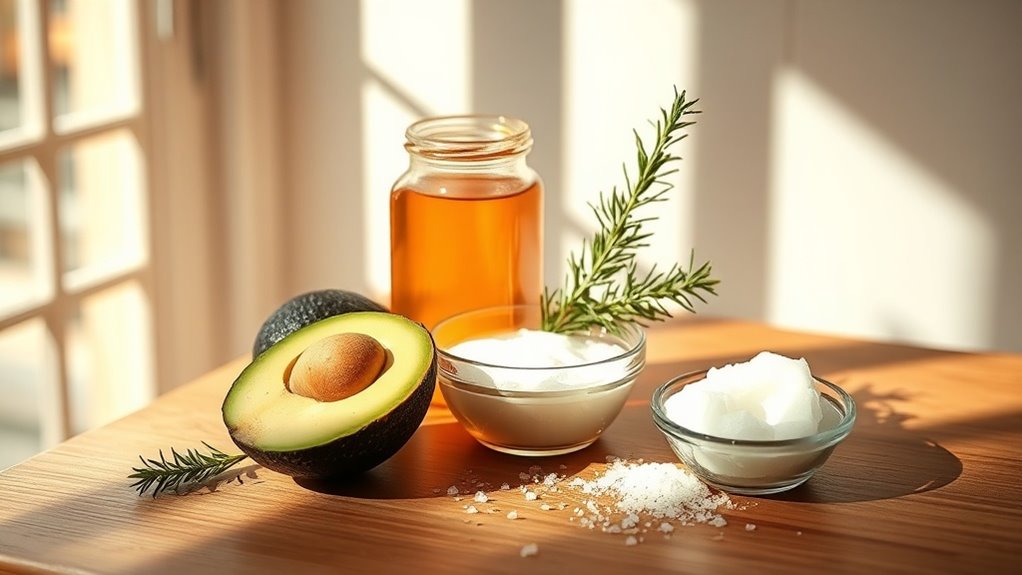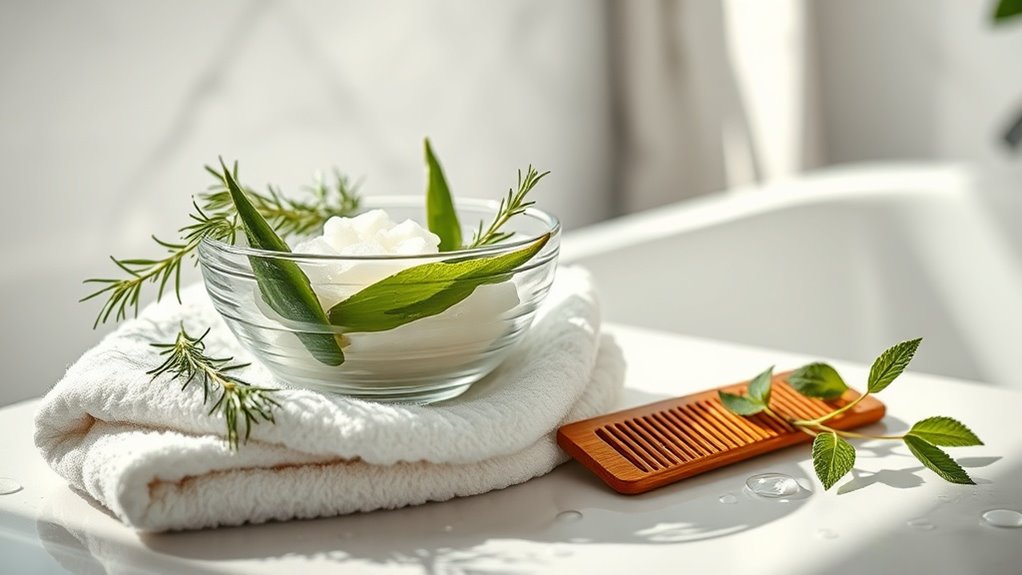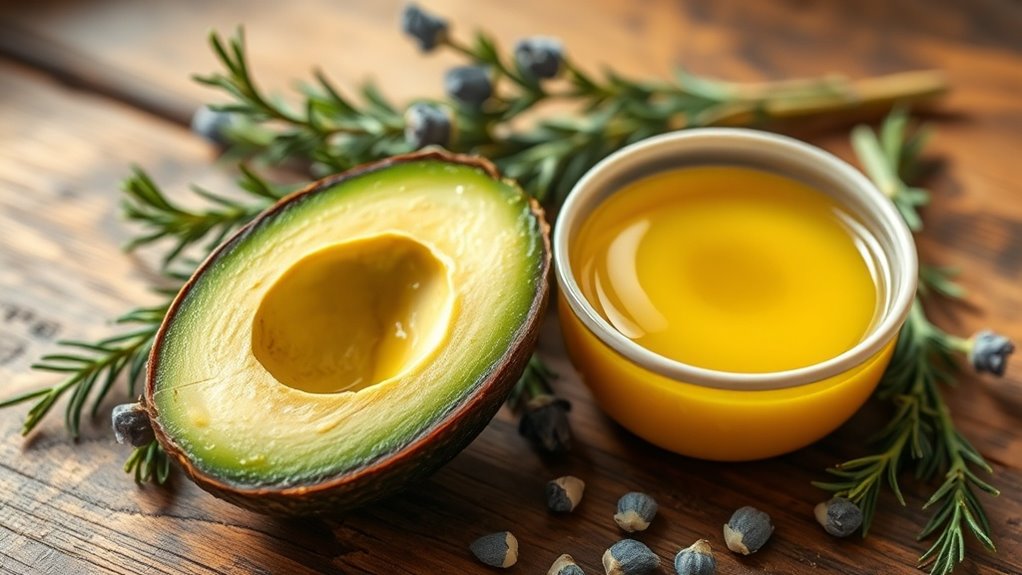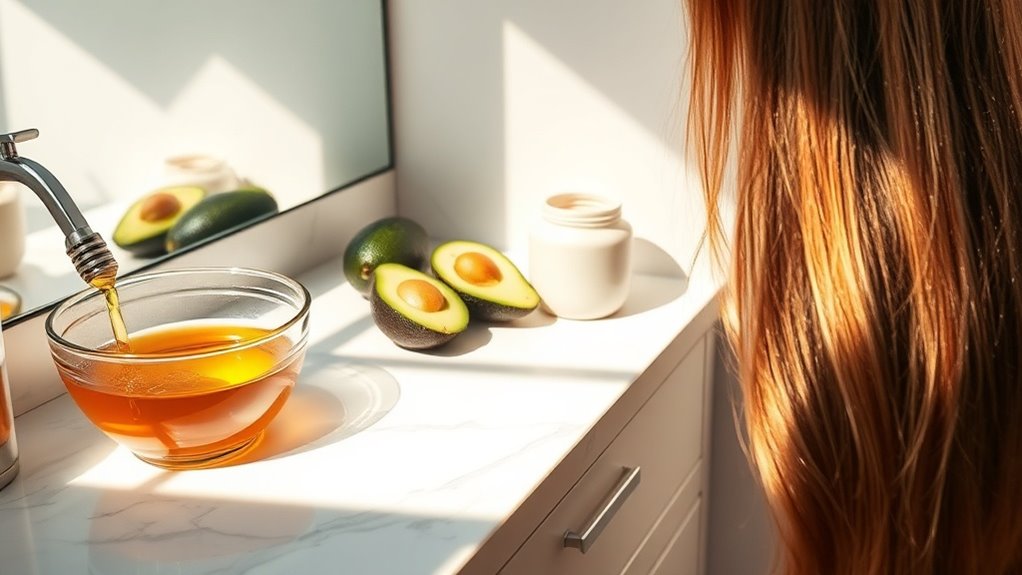Natural Hair Mask That Stops Itching and Flakes
If you’re struggling with scalp itching and flakes, a natural hair mask could be the solution you need. Combining ingredients like aloe vera, tea tree oil, and honey can provide significant relief. Each component plays a unique role in soothing irritation, hydrating the scalp, and combating dandruff. Understanding how to effectively apply this mask is crucial for optimal results. Let’s explore the key ingredients and their benefits further.
Key Takeaways
- A natural hair mask featuring aloe vera, tea tree oil, and coconut oil can soothe irritation and hydrate the scalp effectively.
- The antifungal properties of tea tree oil help combat dandruff, reducing itching and flakes on the scalp.
- Coconut oil deeply moisturizes, supporting overall scalp health and preventing dryness that leads to flakiness.
- Regular use of a hair mask with oatmeal and honey can calm irritation and enhance moisture retention for healthier hair.
- Complement the mask with gentle shampooing and a balanced diet rich in omega-3 fatty acids for optimal scalp health.
Key Ingredients for the Hair Mask
When creating a natural hair mask to address itching and flakes, selecting the right ingredients is crucial for effectiveness.
For an itchy scalp mask, consider using aloe vera, known for its soothing properties and ability to reduce inflammation. Incorporate tea tree oil, which has antifungal and antibacterial effects that can combat dandruff. Additionally, coconut oil provides deep hydration and helps maintain scalp health.
Oatmeal is another valuable ingredient, as it calms irritation and absorbs excess oil. Finally, honey acts as a natural humectant, ensuring moisture retention. Combining these elements can significantly alleviate scalp discomfort and promote overall hair health. Furthermore, using natural ingredients in your hair mask can enhance the benefits of these components for healthier hair growth.
Step-by-Step Application Process
To effectively apply your natural hair mask for itching and flakes, follow these five straightforward steps.
Follow these five simple steps for applying a natural hair mask to soothe itching and reduce flakes.
First, start with clean, damp hair to enhance absorption.
Second, section your hair into manageable parts for even application.
Third, take a generous amount of the mask and apply it directly to your scalp and hair, focusing on areas prone to irritation.
Fourth, gently massage the mask into your scalp for 5-10 minutes to stimulate circulation.
Finally, cover your hair with a shower cap and leave the mask on for 30-60 minutes before rinsing thoroughly with lukewarm water. Incorporating scalp health practices into your routine can further promote healthier scalp conditions!
Enjoy healthier scalp conditions!
Benefits of Using a Natural Hair Mask
A natural hair mask offers numerous benefits for those struggling with itching and flakes.
By utilizing ingredients like aloe vera and coconut oil, you can soothe irritation and hydrate your scalp effectively.
Research indicates that these natural components possess anti-inflammatory and antimicrobial properties, which can help reduce dandruff and promote a healthier environment for hair growth.
Additionally, natural masks often contain vitamins and minerals that nourish hair follicles, improving overall hair health.
Regular use can lead to enhanced moisture retention, reduced flakiness, and a significant decrease in itchiness, ultimately resulting in stronger and more resilient hair.
Incorporating natural ingredients into your hair care routine can enhance the effectiveness of these treatments, ensuring optimal results.
Tips for Maintaining a Healthy Scalp
How can you ensure your scalp stays healthy and free from irritation?
Following these tips can help maintain a balanced scalp:
-
Keep it Clean: Wash your hair regularly with a gentle shampoo to remove dirt and excess oils.
-
Moisturize: Use a light conditioner or scalp oil to prevent dryness and flakiness.
-
Avoid Heat: Limit the use of heat styling tools, as they can lead to scalp irritation.
-
Watch Your Diet: Incorporate omega-3 fatty acids and antioxidants to support scalp health from the inside out. Additionally, consider using a natural hair softening treatment to enhance moisture retention and improve overall scalp condition.
Implementing these strategies can provide a strong foundation for a healthy, irritation-free scalp.
Additional Remedies for Itchy Scalps
What effective remedies can you explore for an itchy scalp? Consider using tea tree oil, known for its antifungal properties, or apple cider vinegar, which balances scalp pH and alleviates irritation. Aloe vera gel also soothes inflammation and hydrates your scalp. Additionally, incorporating natural DIY hair growth treatments can complement these remedies for healthier hair overall.
| Remedy | Benefits | Application |
|———————|————————————|—————————–|
| Tea Tree Oil | Antifungal, antibacterial | Mix with carrier oil, apply |
| Apple Cider Vinegar | pH balancing, reduces itching | Dilute with water, rinse |
| Aloe Vera Gel | Soothes, hydrates | Apply directly, leave on |
| Coconut Oil | Moisturizes, anti-inflammatory | Massage into scalp, rinse




